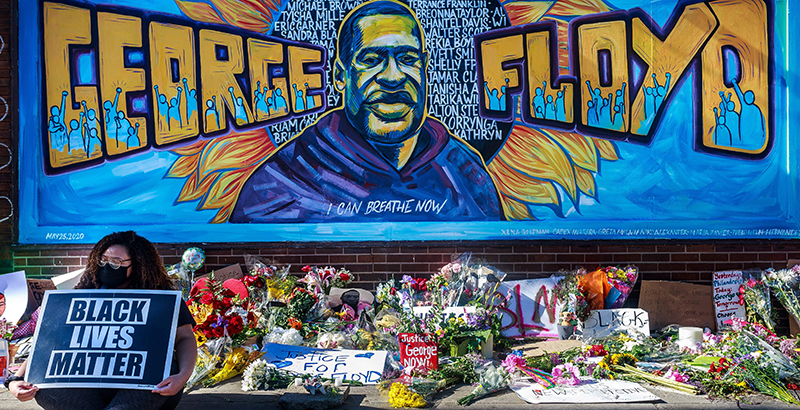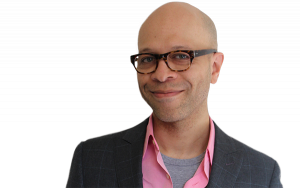Bradford: Black Lives Matter and Black Education Matters Because Freedom Matters. Only When Black Folks Are Safe to Both Learn and Live Will America Be Free

It has been difficult to talk about the killing of George Floyd by a Minneapolis police officer, but that doesn’t mean lots of people have not wanted to talk to me about it. The conversations are all raw but all different. Several of my white friends and colleagues have described the violence of the event with a clarity that is newly found and sharp. They characterize Officer Derek Chauvin’s facial expression as one of a man who knew he could end George Floyd’s life and that nothing would happen because of it. Another noted to me that as Floyd gasped for his last breath he called out for his mother. In the turmoil that emerged in Minneapolis soon after, the head of the Police Officers Federation of Minneapolis wrote of the firings of Chauvin and the other officers at the scene that they had been denied due process. Notably, it had also been denied to Floyd, in the form of one man appointing himself judge, jury and executioner for the alleged crime of passing a fake $20.
It is hard to watch and harder to watch as a Black person. I tell my friends, with the sort of humor of decompression, that Black lives matter, and that I have a Black life and it matters a hell of a lot to me. There is normally some nervous laughter, but also some illumination. The humor that is best often hurts the most and is also the most true. But there is no day when this reflection on existence — or on having been allowed to exist — is not there, and its pain is a drone that can’t be unheard.
The past is instructive when trying to derive meaning from the present. As the protests across America began, I remembered a party I attended as a high school senior. I was one of two Black kids in my class. I lived in the city; my friends, the suburbs. I had no car, so someone had to come get me for me to go anywhere not close to a bus line. I was poor, my classmates wealthy. When we arrived at the half-built house on the edge of a tree-lined street, dozens of people were there. The varsity jackets were a collage of rival colors against the muted glow of gold beer and yellow flame from cigarette lighters. I grabbed a beer. About an hour later, the lights of a police car appeared, shining a spotlight on us all. A neighbor had called the local police about the party. One of the boys informed the officer that it was his family’s house. That had seemed to be enough. The party was ended. The police watched us leave. Then they left as well. As I slumped in the back seat of my friend’s car, I thought that if a similar party had happened with a bunch of Black kids in West Baltimore, how it was policed and the results of the party’s end would likely have been very different.
That party was a night of firsts for me. It was the first time I heard one of my classmates use the word “nigger” with the sort of derisive flippancy that isn’t manufactured as a mistake but instead reflects a deep disregard for Black folks, and I knew that included me. I confronted him that evening, but I felt like I was the person forever hurt by the event. I was so mad and frustrated that I forgot what I even said to him. It was also the first time I really understood that education and the police were not completely separate but instead on a continuum. And that race played a critical part in how they interacted with each other.
If you think about race and education and policing as intertwined, there is also no moment when you do not see how they conspire for the betterment or detriment of the country’s children; and, for much of my adult life, the country’s Black children. The connections aren’t ones of convenience or opportunity; they are realizations born of a life of observation. And at this moment, the overlap could not be clearer. Black Lives Matter activists shout that all lives cannot matter until Black lives do; this call to action necessitates a specific look at how policing happens in Black communities and to Black people. It requires policies that respect that these communities are different and have their own character and expectations, hopes and fears. It demands sympathy and, most importantly, it must respect the right to exist — free and equal — of every Black person. You cannot solve a problem of Black lives with an all-lives solution. Just like the party at the half-built house, a different, empathetic standard has to be applied to address the specific history and circumstances of Black people. This empathy is key — empathy that was clearly absent from George Floyd’s killer.
The revelation about public education is simply this: We can’t have an “all education matters” approach to the challenges of Black education. One that doesn’t require states or districts to meet the needs of kids who, too, are fighting to be free and equal, but instead demands that they conform to systems that have not historically worked for them in the name of the public good. All education cannot matter until Black education does.
As the only people in this nation’s history who have been both physically enslaved and intellectually starved as a result of not just sentiment, or economics, but public policy, no solution that requires the sacrifice of Black people to be successful will be a solution that works for Black people. No policy that maintains the arrangements enshrined in leafy school assignment zones or funding orchestrations will ever meet this standard. No edict that maintains the racist history of redlining in the name of neighborhood schools will rise to this high bar. No directive that tells children where to go to school instead of helping them find the school that works best for them will ever attain this standard. What may work for others cannot be the framework by which what works for Black families is determined. As with the public debate about the police, which has crossed into fundamentally new territory, so, too, with education, where, for Black folks, something wholly new must occur.
As with all problems that are large and that have race at their core, it is easy to believe real change is impossible. Where education is concerned, that is not the case, and indeed, the change has already happened. There are families and educators and schools of all types in this nation that have respected the history of Blackness in this country and worked to close the chasm between the reality of the education Black children receive and our expectation that education allows you to become the best version of yourself, with an equal shot at a future that surpasses that of those who came before you. Now is the time to look to them and learn.
If you are absorbed, however, in the “all education” conformist view espoused by many notably white schooling advocates and policy experts, you might think there are no schools like this, in the same way every Black man whose life is ended too soon by the police is guilty until proven innocent. That there are not more of these institutions is a deliberate policy decision, just as qualified immunity is. One either acts to enable or obstructs to inhibit in both of these cases. And one does so with the knowledge that a price in lives is paid in each. While an errant police officer can end a life all at once, a substandard education means a person spends an entire life not truly living.
The story of Black people is the story of our country’s efforts to live up to its founding values. Black lives matter, and Black education matters, because everyone’s freedom matters. And only when Black folks are safe to both learn and live will all Americans be free.
Derrell Bradford is the executive director of the New York Campaign for Achievement Now (NYCAN).
Get stories like these delivered straight to your inbox. Sign up for The 74 Newsletter

;)

